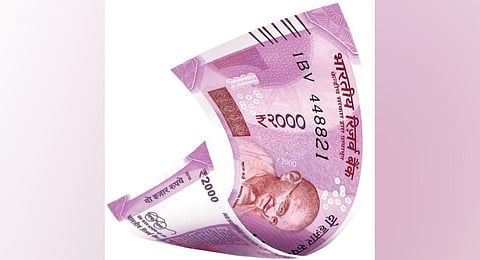

MUMBAI: Clearing the doubts and rumours surrounding Rs 2,000 notes, banks have clarified that customers would neither have to fill out any forms nor provide identity proof such as an Aadhaar card to exchange or deposit these notes, which are set to become a thing of the past.
The country’s largest bank State Bank of India (SBI) has asked its officials not to ask for any form or slip to exchange these notes. In an internal circular to the chief general manager of all its local head offices, SBI has said that the facility of exchange of R2,000 notes by the public will be allowed without obtaining any requisition slip.
“It has been decided that the facility of exchange of R2000 denomination Bank Notes to all members of the public up to a limit of Rs 20,000 at a time will be allowed without obtaining any requisition slip as per the format attached in Annexure- III,” a circular from the state lender said.
Social media was abuzz with unconfirmed reports stating that customers would be required to fill out a form and provide identity proof to exchange or deposit Rs 2000 notes. Also, SBI has clarified that people will not be required to submit identification at the time of exchange. “Further no identity proof is required to be submitted by the tenderer at the time of exchange,” noted the circular.
The Reserve Bank of India (RBI) on Friday announced the withdrawal of Rs 2000 currency notes from circulation but gave the public time till September 30 to either deposit such notes in accounts or exchange them at banks.
Officials of private sector banks have also said the customers would not have to fill out any form or give an Aadhaar card to exchange these notes. However, they added that more details and clarifications are expected in the coming days.
“So far, we have not received any communication from our head office regarding the exchange of Rs 2,000 notes. We have not been told to ask for any identity proof from customers coming to deposit or exchange Rs 2000 notes. Also, there is no form to be filled by customers to exchange these notes as of now. We have not received any such format for that form or slip,” a branch manager of a private sector bank told this newspaper. “We expect to get more clarity on this issue on Monday. We are expecting to witness a huge rush of customers this week,” he added.
For bankers, this announcement by the RBI has revived the memories of demonetisation announced in November 2016 when branches were flooded with customers coming to deposit their notes. While banks are getting ready for the upcoming rush of customers, they will not accept Rs 2000 notes on Monday.
They have advised customers not to visit the branch to exchange or deposit these notes on Monday. “We will not accept any Rs 2,000 note on Monday and will start exchanging or depositing these notes from May 23. We have already witnessed a surge in queries from customers on Saturday regarding this issue, but we have nothing concrete to tell them,” said a senior official of a public sector bank.
“As of now, customers do not need to fill any forms or provide identity proof to exchange Rs 2000 notes,” he clarified. There is also confusion about the status of these notes after September 30. As per the central bank, these notes will continue to remain legal tender even after September 30 meaning they can be used for transactions.
Customers can deposit Rs 2000 banknotes into their bank accounts or exchange them for banknotes of other denominations at any bank branch. In order to ensure smooth operations and to avoid disruption of regular activities of bank branches, exchange of Rs 2000 banknotes into banknotes of other denominations can be made up to a limit of Rs 20,000.
The move comes amid concerns about the highest denomination notes being used to hoard black money.
The RBI had stopped printing Rs 2000 notes in 2018-19 and the notes were rarely in circulation.
The Rs 2000 denomination banknote was introduced in November 2016, primarily to meet the currency requirement of the economy in an expeditious manner after the withdrawal of the legal tender status of all R500 and Rs 1,000 banknotes in circulation at that time.
As per the RBI, about 89% of the Rs 2,000 denomination banknotes were issued prior to March 2017 and are at the end of their estimated life span of 4-5 years. The total value of such banknotes in circulation has declined from Rs 6.73 lakh crore at its peak of March 31, 2018 (37.3% of notes in circulation) to Rs 3.62 lakh crore constituting only 10.8% of notes in circulation as on March 31, 2023.
Rs 2,000 currency note saga
Banks will start accepting 2,000 notes from May 23
Customers can deposit Rs 2000 banknotes into their bank accounts or exchange them for banknotes of other denominations at any bank branch
Exchange of J2000 banknotes into other denominations can be made up to a limit of p20,000
2000 denomination banknote was introduced in November 2016
As per the RBI, about 89% of the 2,000 denomination banknotes were issued prior to March 2017